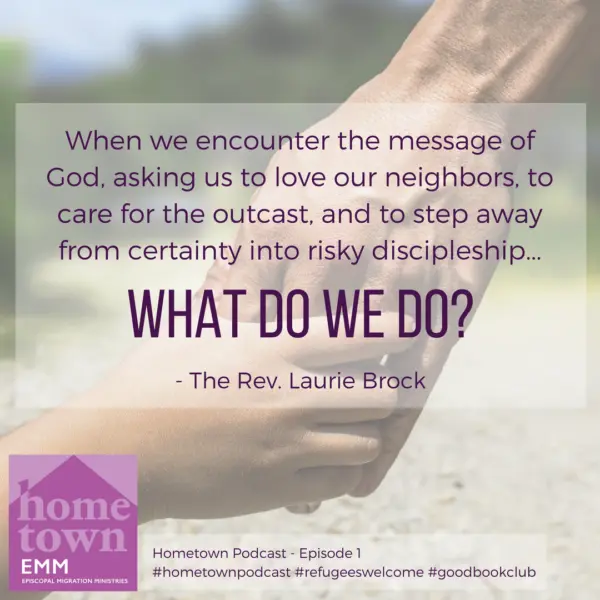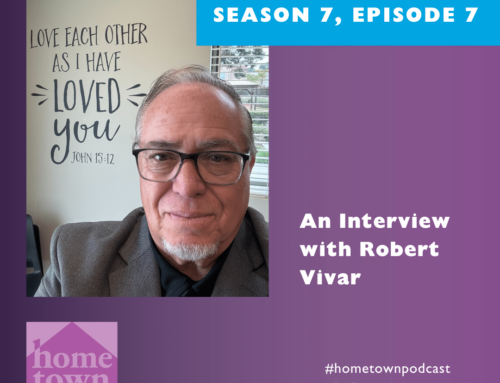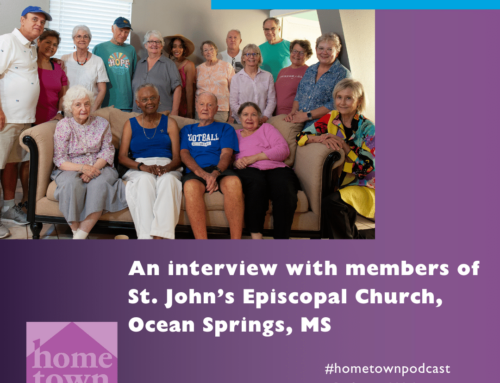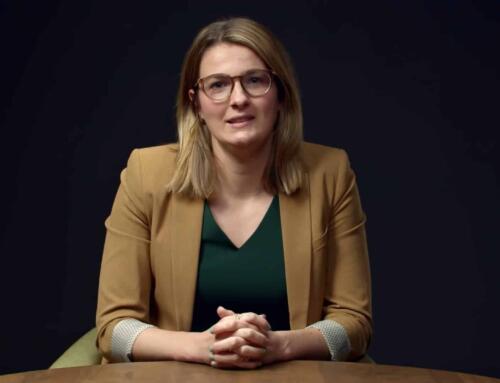Reflection on Luke 1:1 – 4:13
By The Rev. Laurie Brock
Fear makes its appearance quite early and rather frequently in the Gospel of Luke. We first meet fear as Zechariah offers incense in the sanctuary of the Lord when he is interrupted by Gabriel, an angel of the Lord. Zechariah, we read, is terrified, to which Gabriel responds (as translated in the New Revised Standard Version of the Bible), “Do not be afraid.” Gabriel visits Mary soon after and begins with the same request of Mary: “Do not be afraid.”
Gabriel’s request translated as, “Do not be afraid,” seems a bit too nice and too calm and too gentle to me.. Gabriel actually says (at least as I read it in the Greek), “No fear!”
It’s a big and brash statement. “No fear!” is written in bold and spoken by an angel inked up with tattoos, with thousands of eyes of flame, and wings that howl like the banshee winds of blizzards. This is a phrase of challenge. This is a phrase of defiance. This is a phrase alerting us that this particular encounter with the holy will involve a major tectonic shift in our well-ordered world.
Gabriel delivers a message to both Zechariah and Mary that will be unsettling, hopeful, unexpected and unnerving. Zechariah and Elizabeth and Mary and Joseph will be parents to sons, John and Jesus. And these sons will spend their lives confronting us with our own justifications to embrace hate over love, disturbing us when we limit God’s love, and unsettling us when we remain too comfortable.
They will give us every reason to fear the Lord and what God asks of us in love and hope.
The word fear (in Greek, phobos) appears in Luke more times than in any other Gospel. Many of us don’t particularly think of Luke as the scary Gospel, filled with fear. After all, Luke gives us the Nativity Story and the Parable of the Good Samaritan and the Sermon on the Plain.
And yet, Luke’s use of the word fear meets us in a very human place. And this fear isn’t a flustering feeling; it’s alarm, terror, and it’s a moment where we think we may need new underwear.
And it is of God.
Fear is a very real part of being human. We fear that which can hurt us. We fear change, especially change with loss. We fear the other. Humans can spend a fair amount of time in fear. We can, when faced with something that looks hopeful and promising from the outside, like the birth of a long-awaited child, respond with fear.
Fear cements us in the present, unable to move into the fullness of life with God. Fear whispers to us that we are inadequate to do what God has asked, that this particular act of love will tax our budget and our souls. Fear covers the phrase, “But we ‘ve always done it this way!” with gold, and demands we kneel before the past, unwilling to allow God to change us.
God does not give us the message of, “No fear!” to eradicate fear, but to remind us fear is not the only response to the message of God. Fear may be a response, but hope, love, and courage also get to come to the party.
And they are a rowdy bunch, who dare to look Gabriel in the eyes of flame and say, “So what now?” They uncement our feet from the ground as we follow the path to encounter God, however thorny and difficult the path may be.
Fear still exists, but so does hopeful courage in this Christian journey.
Recently I received a text message one Saturday afternoon from our local refugee resettlement agency.
“A family is arriving Thursday. I know it’s a longshot, but could you sponsor them?”
What?! Could we help set up an apartment, commit for three months to helping a family learn a new language and a new culture, and fund all of this that isn’t in the budget?! During an already busy season of Advent and the upcoming season of Christmas? Fear sat down for coffee with me and carefully explained why we couldn’t do this… why we couldn’t take on what was being asked of us as a congregation.
But hope came in the room and sat down at the table, too. She reminded me of the plight of this particular ethnic culture. They had been the victims of ethnic cleansing in their home country. And this family had spent their entire lives in a refugee camp.
Their. Entire. Lives.
That camp was home. Their friends were fellow refugees. The impermanence of the camp had been the one permanent thing in their lives for almost 30 years.
Until this very moment.
In my mind, I imagine them hearing the voice of Gabriel shout, “Remember, NO FEAR!” as they began the process of leaving all they have known to resettle in Lexington, Kentucky. When they arrived here on Thursday, for the first time, they slept that night in their home and began anew. Because to be a refugee, to be a stranger in a strange land, demands hopeful courage most of us will never have cause to muster.
So, our congregation heard all fear had to say, but we also heard the message of God, the message of Gabriel, and the message of our ancestors, shouting, “No fear! Remember!” And we followed hope, love, and courage into ministry with refugees.
When we encounter the message of God, asking us to love our neighbors, to care for the outcast, and to step away from certainty into the risky love of discipleship, what do we do?
Do we repeat the messages of fear? Do we consider all the things that could be or might or probably will go wrong?
Do we withdraw from a holy encounter or challenge because we think we are not enough?
Do we become worried that our church will be “too political” if we engage with refugee ministries?
Do we become deaf to the language of courage and hope?
Or do we hear again the message of the angels, the shouts of hope, and the voices of courage and love saying to us in bold letters, shaking the mountains, and stirring up the seas…
People of God: NO FEAR!
The Rev. Laurie Brock is the rector at the Episcopal Church of St. Michael the Archangel in the Diocese of Lexington, Kentucky. Mother Laurie is co-author of Where God Hides Holiness, and is the author of the forthcoming book from Paraclete Press, Horses Speak of God: How Horses Can Teach Us to Listen and Be Transformed, available for pre-order on Amazon.com. She blogs at www.revlauriebrock.com.




